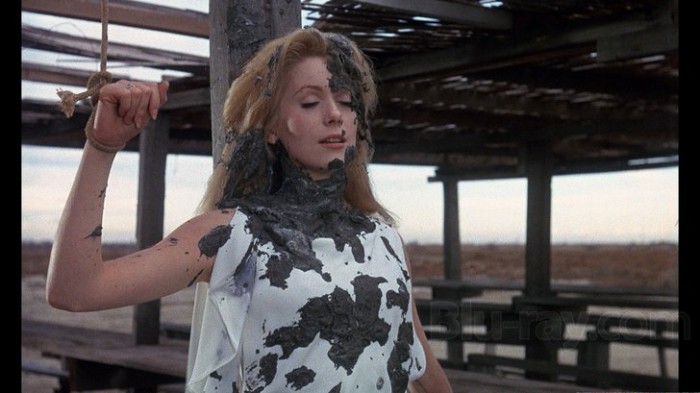Belle de Jour is Luis Bunuel’s most recognizable and commercially successful film, praised for its status as an erotic masterpiece despite demonstrating virtually no sexual explicitness. Friends with both Salvador Dali and André Breton, Bunuel was a pioneer of surrealist cinema and enjoyed using the medium of film over his 50-year-long career to demonstrate his fascination with Freudian conceptions of the mind. Bunuel experimented with virtually every genre, from melodrama to western, consistently depicting just how powerful and invasive the subconscious can be. He reflected on the radical Belle de Jour in an interview, saying: “By the end, the real and imaginary fuse; for me they form the same thing.”
The film opens with a wide shot of a black horse-drawn coach approaching on a country lane: A beautiful Victorian image juxtaposed against the film’s exploration of sexual fantasy. Séverine (Catherine Deneuve) and her husband Pierre (Jean Sorel) are the coach passengers. A physically stunning and refined couple, the two appear to be a paragon of marital bliss; however, once the carriage is parked, Pierre orders the coachmen to bind, strip, and flog Séverine. She cranes her neck and appears to be warming to this brutal ravishing when the scene abruptly cuts from fantasy to reality—“What were you thinking about?” Pierre asks Séverine—Bunuel strategically begins and ends his film with this question and demonstrates the difficulty involved in offering a candid response.
The name Séverine is the feminine derivation of Séverin, the protagonist from Baron von Sacher-Masoch’s novella Venus in Furs (1870). As the term “masochist” originated from Sacher-Masoch and his perversions, Séverine proves to be an appropriate name for this fetish-driven female lead. Séverine’s icy-cold demeanor and demure attitude disguise her libidinous impulses to be dominated and controlled. The film’s plot revolves around Séverine surreptitiously deciding to spend her afternoons working in an upscale brothel, run by an experienced businesswoman named Madame Anais (Genevieve Page).
Madame Anais is referred to Séverine by her husband’s friend Henri (Michael Piccoli), despite the fact that Henri is attracted to Séverine for her purity. Upon discovering her day job later, he chides: “What attracted me about you was your virtue. You were the wife of a boy scout. That’s all changed now. I have principles—unlike you.” This moment of irony is just one of Bunuel’s references to the repressive patriarchal order dictating bourgeois society and forcing Séverine to conceal her fantasies.
While at the brothel, Séverine receives the sobriquet “Belle de Jour” and is doted upon by her two coworkers, Charlotte (Françoise Fabian) and Mathilde (Maria Latour) for her remarkable class. Throughout her time at the brothel, Belle de Jour daydreams about having black muck flung at her as she wears a white dress, performs in a hasty necrophilic ritual, and falls for a metal-toothed thug named Marcel (Pierre Clémenti). “For you there is no charge” is what she tells Marcel when they first meet, instantly attracted to his cruelty, insults, and arrogance however, Marcel is merely a sexual prop for Séverine, perfectly ornamented in shiny boots of leather with a matching overcoat and a walking stick. When he begins to pursue her, Séverine’s fantasy world and reality clash in a disastrous way resulting in the film’s highly ambiguous ending.
Belle de Jour not only dives into the subconscious of a bored housewife, but laughs at the morals of bourgeois society. At Madame Anais’ brothel, the audience is introduced to a flock of lecherous businessmen along with an internationally-known gynecologist begging to be punished. Pierre’s character is the pinnacle of irony, as he remains blissfully ignorant of Séverine’s life as Belle de Jour and wishes that she could be more sexually attentive. The film is overall much like Séverine’s character—beautiful and elegant in its costumes and design with deeply complex and bewildering implications.








